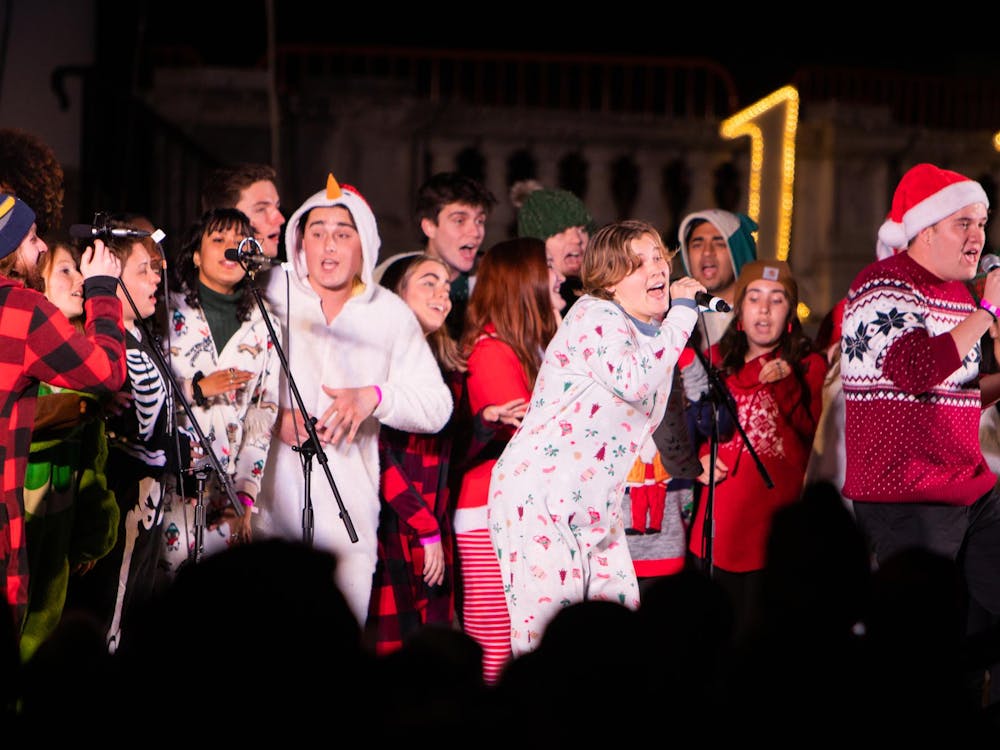Graceful ladies stroll around in large, floppy hats. Men chat easily in expensive suits, afternoon cocktails balanced in their hands. Henna-tattooed gypsy women dance seductively near large white tents. The smell of horses and the crackling of the announcer's voice waft through the cool September air.
The Virginia Commonwealth Polo match has begun. The annual charity event is held at South Ceres farm - a Goochland estate about half an hour from Charlottesville.
In this genteel sport, where wild-eyed polo ponies charge across the field with riders in colorful jerseys urging them on, the University manages to make its presence known.
The British Combined Services team galloped onto the field astride steeds donated for the event by the University polo team. The University has allowed riders to use their horses in the event each of the 15 years that the match has been running.
As the riders bunch up in a frenzy to get at the ball, swinging mallets furiously, University Polo coach Dana Fortugno explains why his ponies are involved in the event.
"It's important to support the Commonwealth Cup because they support U.Va. polo in return," Fortugno said.
The University team donated 24 ponies to the event this year, an act Fortugo said helps foster a strong link between the University team and the sport of polo on both the state and national level.
|
"The best thing about polo, is that you ride like mad, you get to hit a ball and you get to hit people," Hulfish said. He leans back in his chair and grins broadly.
He said that although he often serves as an announcer or umpire at matches, he still enjoys playing on the field more than anything else. Polo is a difficult game and the umpire or announcer needs to know what he is doing, he added.
Sitting near Hulfish at the table, a small woman with a nervous smile shuffles through a pile of papers. She looks up and extends her hand, introducing herself as Angie Abbasi, chair of the event.
Abbasi has worked arduously on the event for about nine months with the help of over 300 volunteers and is very excited about the "good cause behind great polo" as well as the crowd of 4,500.
All proceeds from tickets and corporate sponsorships are donated to the Goochland Fellowship and Family Services (GFFS). Abbasi said that the charity offers education programs for the young as well as support services for the elderly.
"The charity offers a broad range of support services that help people help themselves," she said.
For the past seven years, the owners of the South Ceres Farm have asked that the proceeds from the event be donated to a single charity instead of several different beneficiaries, Abassi explained.
She added that people feel as though they are benefiting a good cause because they see that the money goes straight to GFFS.
"Our sponsors knows they can trust us because we are financially well-managed. We aren't spending money on expensive cars or offices with marble floors," Abassi said as she ran her fingers through her short, reddish hair.
A buzzer rings signaling the end of the chukker, the name for a period in the sport of polo. Hulfish's voice blares over the loudspeaker as he announces it is time for divet-stomping.
The crowd descends upon the field and engages in the long-standing tradition of milling around the polo field and stomping their feet on the ground to fill in the holes the mallets and horses have made during the game.
A young woman enters the field wearing a gray T-shirt and jeans in contrast to the Gucci heels and Ralph Lauren shirts donned by many of the other divet-stompers.
She is Astrid Brock, a former University polo team member who says she majored in polo more than civil engineering during her time at the University.
"Johnny, Johnny, Johnnyyy!" Brock screams, pointing to a small chestnut horse led on the periphery of the field.
Johnny, one of the University polo ponies, catches Brock's eye as she passes with a British rider on her back. Over the summer, Brock leased Johnny from the University polo team in order to continue practicing polo in the area.
"I just never left," Brock said with a grin. She still lives outside Charlottesville and now works on a nearby horse farm.
"Polo requires good horsemanship and good hand-eye coordination," Brock said, although she added that the players, unlike the ponies, do not have to be athletic.
She said she has often spotted more than one player in between chukkers smoking a cigarillo or two, but the ponies are far from unfit, and are usually Argentine-bred thoroughbreds or ex-racehorses.
"All they want is speed, speed, speed," Brock says of people looking for attributes in a polo pony.
As the divet-stomping winds down, Brock takes a seat on the side of a hill, and emphatically uses her hands to explain the rules of the game.
A polo match consists of two teams with four mounted players each. On an open field there are six chukkers of seven minutes each. The objective is for a player to hit the ball between the two goal poles using a mallet. However, a pony can also score if it kicks a ball through.
Players are ranked on a scale ranging from negative two to ten, depending on ability. A player must try to hit the ball while remaining conscious of the line of the ball and being careful not to cross over into another player's "lane."
Of course, the polo pony itself is also important in a polo match. Ponies have braided tails and shaved manes to keep them out of the players' way.
Two umpires are always on the game in any given match, while a referee-in-stands serves as an off the field observer.
While Brock is discussing the sport's origin in India, Fortugno strides up, grinning in a white polo shirt and overalls. Fortugno coached Brock at the University and is immensely proud of his team and their dedication.
"We have the finest polo facility in the country," Fortugno said.
The men's and women's teams are ranked second in the nation and owns 65 ponies, all of whom have been donated to the polo team, according to Fortugno.
On this sunny afternoon ladies and gents stroll the field in their Sunday best. Women wear long dresses and sun bonnets while men walk around in khakis and crisp oxford shirts. And many, after just exiting the wine-tasting tent, can be seen mingling with a program in one hand and a wine glass in the other.
Although the Americans defeated the British, 9-8, the match is by no means the only reason to come out.
The feel of a country fair is in the air as a spectator strolls the field and encounters jugglers, belly-dancers and craftspeople. The Dog Agility Contest, where dogs jump through and over various obstacles, provide a sort of pre-game show for those who arrived early.
Riders and drivers parade around in Elizabethan dress, the theme of this year's Commonwealth Cup. Spectators walk greyhound dogs with little bonnets tied to their heads. A woman with several plastic wine glasses, horseshoes and grapes attached to her hat accepts her award for "The Most Fashionable Hat" according to this year's Elizabethan theme.
And the prize awarded to the Most Valuable Player? A bottle of scotch donated by sponsor Glenlivet Scotch.
(Cavalier Daily Associate Editor Christa Dierksheide contributed to this story.)




